Tuesday, October 31, 2006
A Fond Farewell
The managing editor of Filmmaker Magazine sits amid the steady hum of computers in his spacious but windowless office, having just completed work on the spring issue of “the magazine of independent film,” three months in the making.
Matthew Ross, 30, has been the managing editor of Filmmaker since he joined the magazine in 2003. He is one of only two staff editors at a magazine that reaches over 60,000 readers each issue, many of whom are filmmakers themselves.
As managing editor, Ross oversees all production, content and photo shoots; acts as chief contact for the magazine’s editorial staff, writers, publisher, designer and advertising director; represents the magazine at film industry events and film festivals; and, of course, writes features and reports for the magazine.
“While we’re in production, which takes place about three weeks every three months,” Ross says, “I’m sort of like the assistant director or production manager of the magazine. The rest of the time, I’m finding stories for us to cover.”
Born and raised in Manhattan, Ross attended Harvard University, where he studied film production and graduated in 1998 with a Bachelor of Arts degree in Visual and Environmental Studies. Like many of his colleagues at the magazine, Ross is also an aspiring filmmaker. His short film Curtis and Clover premiered at the 2001 Hamptons International Film Festival, where it was nominated for the Golden Starfish Award. He recently completed another short film, Lola, which should hit the festival circuit later this year.
Ross sees his career in journalism as part of a balancing act, a way to pay the bills while he simultaneously works on his career as a filmmaker.
“Writing and directing movies is never a hirable job at the start,” Ross says. “I’ve always loved writing – especially writing about movies. Writing about movies was the one thing I knew could do right off the bat.”
Immediately after graduation, Ross went to Los Angeles, where he briefly worked for Dimension Films and Miramax Films and found freelance production work on various documentaries. But, he says, “I wanted something more intellectually stimulating. I kind of fell into journalism by accident.”
Ross wrote for several online publications during the dot com boom, including Directors World, EditorsNet and 2-pop. Less than a year later, however, the boom went bust and he found a job at Variety.
He returned to New York as a staff film reporter, but says now that even though he loved working for Variety, he “didn’t want to be a business reporter.” Ross left Variety in January of 2002 and soon began working for indieWIRE Publications, where he was senior editor, overseeing all editorial content.
He left indieWire at the end of 2002 and began working for Filmmaker shortly thereafter.
“It was time to leave,” he says. “I was always a huge fan of Filmmaker. Plus, a quarterly magazine offered a more flexible schedule.”
While at Filmmaker, Ross has continued to write freelance articles for Variety, the Village Voice, indieWire and the Criterion Collection, among other publications. He has written and will be directing his first feature film, Plays Well with Others, with Cynthia Nixon attached to star, and is already working on his second feature, a psychological thriller titled Frank & Lola.
“Filmmaker has been very good to me,” Ross says. “But my ultimate ambition is to make films.”
You Can't Make a Film on Your Own
Shooting People began as a free online network, with about 60 of Search and Le Couteur’s friends as its first members, but started charging membership fees three years ago. Search says that only about 30 percent of their members shifted to the pay model initially and that they have yet to make a profit in the U.K., but over time they were able to attract more new members and expand their services. Now there are over 29,000 “Shooters” in the U.K. and U.S., where for an annual fee of $40 members can find and develop scripts, cast and crew their films, and get advice from other Shooters throughout the filmmaking process.
“I was coming to New York a lot, so I knew it and I saw that there was a comparable indie scene there,” Search explains. “I was actually surprised there wasn’t already something like Shooting People in New York.” Los Angeles seemed liked the next logical step, and depending on the group’s success there Search and Le Couteur will consider taking Shooting People to more locations worldwide.
However, to be most useful Shooting People needs to be more than just a phantasmagoric network of e-mails and online message boards. To that end Ingrid Kopp, who is in charge of Shooting People in the U.S., has started to introduce programs similar to those offered to U.K. members - such as "Shooter socials" and guest speakers - to expand the group’s North American presence. And Shooting People’s Mobile Cinema, already an annual hit in the U.K., will soon launch in the U.S. on a two-week cross-country tour from New York to Los Angeles, stopping wherever they are called along the way to screen the best of their members’ short films.
“The idea of Shooting People is so simple,” Kopp says, “but it can go so far. There’s much more we can do.”
Search and Le Couteur have recently become as concerned with the challenges of independent film distribution as they are with its production. As a result, Shooting People recently launched Word of Mouth, its new DVD label, and released its first title Best v Best, a collection of international award-winning shorts available only in the UK. Word of Mouth will also release the upcoming DVD for Rupert Murray’s 2005 documentary Unknown White Male, which was co-produced by Search.
“We’re really proud of the model we’ve developed,” Search says. “Shooting People is self-sustaining, created by filmmakers for filmmakers.”
For more information about Shooting People or to become a member, visit www.shootingpeople.org.
Thursday, October 26, 2006
Tom Sykes at Barnes & Noble
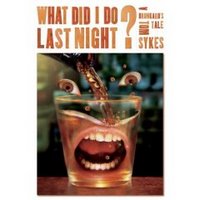 "The thing I miss about drinking is getting absolutely, mind-blowingly drunk," says Tom Sykes, a former writer and editor for such varied publications as British GQ and the New York Post, among many others, and now the author of What Did I Do Last Night? A Drunkard’s Tale. "But nothing else. Not the mysteriously empty bank account, not waking up hung over in the morning, not the fear that my wife is going to leave me."
"The thing I miss about drinking is getting absolutely, mind-blowingly drunk," says Tom Sykes, a former writer and editor for such varied publications as British GQ and the New York Post, among many others, and now the author of What Did I Do Last Night? A Drunkard’s Tale. "But nothing else. Not the mysteriously empty bank account, not waking up hung over in the morning, not the fear that my wife is going to leave me."Speaking with a thick British accent in the cramped music section of a Barnes & Noble in Chelsea, the youthful Sykes reveals, with humorous candor, his unlikely transition from accomplished journalist to unemployed alcoholic to author of his own drunken memoirs. After he was "fired from every newspaper in London," including the Daily Telegraph and the Evening Standard, Sykes worked for British GQ, where colleagues at first found his hard-drinking lifestyle humorous – but soon his lies and excuses for his behavior became a source of aggravation.
Sykes then came to New York in 2003 to write freelance for the New York Post and other publications. At the Post, he edited a bar column titled “Block Party” and a dating column called “Meet Market,” and contributed to the famous gossip column “Page Six.” Partying had become his career.
When he finally realized that his alcoholism had taken over and was threatening to destroy his entire life, Sykes says that he stopped drinking “cold turkey” and saw life improve dramatically (“I do look completely different. I used to be green.”). But since his career was based on alcohol, he was suddenly out of a job. So he sought out any opportunity to write again.
Writing about getting sober was the last thing he wanted to do. Although Sykes says that he found writing What Did I Do Last Night? a cathartic process, there were some interesting challenges along the way. “There were bits and pieces I didn’t remember,” Sykes says of his alcohol-drenched nights, then releases a self-deprecating laugh. “I would go further. There were some bits and pieces I do remember.”
Thursday, October 19, 2006
A Talk with Robert Lipsyte
“The separation of jocks and geeks never ends,” Lipsyte says. “Most presidents, senators and surgeons are jocks. The president, our asshole-in-chief, is the kind of guy who would shoulder kids in the hallways; now he shoulders small countries. Clinton always wants a mulligan. Rumsfeld is a bully on the squash court.”
Lipsyte sees the social constructs that have been created in middle school and high school hallways and locker rooms continuing well past graduation. One might think that Robert Lipsyte, who is approaching his sixty-ninth birthday and speaks softly due to his use of a hearing aide (even while he often talks and acts like a man half his age), would have long ago forgotten the bullies and nerds of his youth. But as many of his readers and countless more Americans know, the lessons learned on the sports field and locker rooms can have a greater impact than those in the classroom.
As Lipsyte has observed with the long-running but unspoken popularity of steroids, the rapid inflation of professional sports contracts, and even his own experiences with certain New York Times editors, jock culture in sports affects all of American culture as a whole. It should come as no surprise that a man who claims to have never been a sports fan (“I’m not uninterested, just disinterested,” he says) would be critical not only of the athletes involved, but of our entire sports-oriented culture.
Sentimental Memories
Pop-Pop’s workbench was his territory, cluttered with hammers, nails and pencils in the corner under the rickety wooden stairs that even today still need fixing; and Nana’s was the adjacent rusty wash basin and drying rack where she carefully washed and mended their clothes, and once upon a time their children’s and even mine. When Pop-Pop and Nana kept getting older and the stairs seemingly got steeper, we went down to the basement less and less frequently. When Nana died, I stopped going down there altogether. But I still remember the cluttered coziness of that room, as well as the scary first step you had to take before you could reach the hanging light bulb at the top of the stairs in order to go any further. And I miss it.
Tuesday, October 17, 2006
One Night at McSorley's
 When I tell people that I go to school in New York City, one of their first questions is usually, “Have you heard of McSorley’s?” It seems that there are very few people who have not heard of McSorley’s Old Ale House, which is located at 15 East 7th Street in “Little Old New York.” With the proud motto, “We were here before you were born,” McSorley’s has become one of the most famous bars in the country. In truth, I have become very familiar with the place over the last few years.
When I tell people that I go to school in New York City, one of their first questions is usually, “Have you heard of McSorley’s?” It seems that there are very few people who have not heard of McSorley’s Old Ale House, which is located at 15 East 7th Street in “Little Old New York.” With the proud motto, “We were here before you were born,” McSorley’s has become one of the most famous bars in the country. In truth, I have become very familiar with the place over the last few years.On any given Thursday night, McSorley’s can be both local pub and tourist hub. Fortunately, I could see through the window that this particular Thursday was fairly quiet, with clusters of patrons sitting comfortably around a collection of wooden tables, and only a few men standing patiently while waiting for their drinks at the long bar, all in the main front room. Before I walked inside, Brendan appeared beside me. A tall, middle-aged Irish man who wears a cowboy hat no matter the weather, Brendan has been working the door at McSorley’s for as long as I’ve been going there - certainly longer - and we have gotten to know each other over the years.
“It finally got cold today,” he said in his thick Irish accent.
“Yeah, unfortunately.”
“No, no, we need it. If it doesn’t get cold enough to kill off all those bugs, we’re in trouble. Remember the scare with that West Nile Virus?”
“Even if we need it, that doesn’t mean I like to be standing outside in the freezing cold.”
“Well like it or not, it’s better for us to have a real winter.”
I got the sense that our brief conversation had come to an end, and I went inside to sit down. My feet brushed through the layers of sawdust spread over the hardwood floor, and the smell of the place hit me like the inside of a fake leg. But it also felt familiar and welcoming, with its walls over-crowded with memorabilia, news clippings, photographs and bric-a-brac, pictures of former presidents next to the medals and badges of retired firemen and policemen, and even a dusty bronze bust of JFK behind the bar wearing a Navy sailor’s hat.
I immediately saw Timmy, the bartender, who directed me to a table near the coal oven that provides heat for the entire room. Timmy is middle-aged and Irish, like everyone else who works at McSorley’s, and like the other bartenders he wears the shapeless grey jacket that has been their uniform for ages; but he is noticeably shorter than the other barmen, with long salt and pepper hair and a well-groomed beard.
“Light or dark?” Timmy asked, referring to the only two types of beer served at the bar – McSorley’s Light or McSorley’s Dark.
“Half and half, Timmy.”
McSorley’s is always crowded, even on a quiet night, and on that night nearly every seat was full. I was sitting at a table with strangers. To my right was a French couple; an old man with long gray hair who slightly resembled Spalding Gray, wearing a black jacket and a gray shirt and tie, was chatting with a pretty young woman wearing a white scarf. To my left, a young man and woman in trendy T-shirts and glasses were sipping their beers. At the next table I noticed two 30-year-old men debating sports and enjoying the beer. McSorley’s certainly attracts a diverse crowd of people, all of whom are simply looking for a good time.
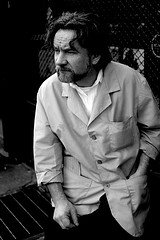
In moments Timmy returned with the beer, one half-pint of light, amber liquid, the other half-pint thick and dark.
“This one’s on us. Cheers.”
“Thanks, Timmy.”
See this movie.
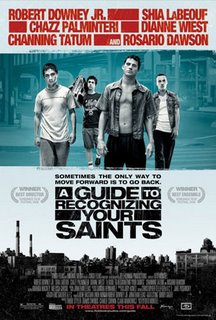 This blog won't often cover current events or New York happenings in a timely fashion - which I guess half defeats the purpose of even having a blog, but whatever. The point is, I'm taking the time to tell you to go see a movie that's currently in theaters - A Guide to Recognizing Your Saints.
This blog won't often cover current events or New York happenings in a timely fashion - which I guess half defeats the purpose of even having a blog, but whatever. The point is, I'm taking the time to tell you to go see a movie that's currently in theaters - A Guide to Recognizing Your Saints.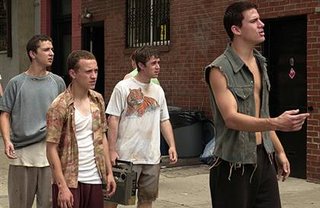 The film takes place both in the past and the present. Robert Downey, Jr., as Dito, returns to Queens after 20 years away from home to confront his ailing father, while he remembers the thug friends and tragic events that led to his initial departure. Shia LaBeouf plays the young Dito, and he is flanked by Tatum and a cast of brilliant young actors who bring their characters to vibrant life.
The film takes place both in the past and the present. Robert Downey, Jr., as Dito, returns to Queens after 20 years away from home to confront his ailing father, while he remembers the thug friends and tragic events that led to his initial departure. Shia LaBeouf plays the young Dito, and he is flanked by Tatum and a cast of brilliant young actors who bring their characters to vibrant life.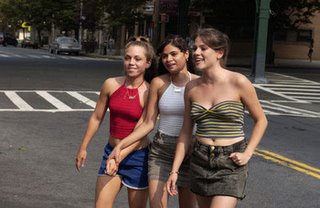
Sunday, October 15, 2006
An interview with NYU student Angela Chiang
Angela’s history as a figure skater has colored the other details of her life in more ways than one. A petite girl of 21, wearing blue jeans and a faded black tank top that reads “Ice Theater of New York,” she looks more like one of the city’s Lower East Side hipsters than the longtime figure skater and instructor that she is. This is probably intentional; skating has not always brought her the happiness it does now.
Born in her namesake city of Los Angeles to immigrant parents (her father Kevin is from Taiwan and her mother Eri is from Japan), Angela moved to Staten Island with her family when she was two years old. She was transplanted once again when she was three to New Jersey’s Bergen County, where her family has remained ever since.
At the age of four, Angela began skating – an activity that demanded much more than the typical Saturday morning soccer practices or after-school tutoring sessions of other children. She was entering skating competitions at a young age, and when it was time to enter high school, she enrolled at the Harvey School, a boarding school in West Chester known for its ice skating program.
But through it all, Angela realized that she was feeling forced to skate, as if she had been brainwashed and sheltered by her parents for more than 10 years before she finally decided to quit. That decision caused her to drop out of the Harvey School after her sophomore year and enter the public high school, where she says she joined the boy’s hockey team “just to be rebellious.”
Angela took time off from figure skating – even while feeling the pressure from her mother to return to her training – but then rediscovered her love for it all on her own. Since the age of 17 she has been a skating instructor at Chelsea Piers. By lessening her time commitment to the sport, Angela has been able to pass on a love of skating that she never felt before. And even though she no longer meets with Tara Lipinski’s coach, will probably never again compete against Sarah Hughes, and might not train with the Austrian, Japanese or Chinese national teams any more, she is much more content knowing that she still skates because she actually wants to.
Angela is now a senior at NYU majoring in Journalism, with a minor in Metropolitan Studies. Like many college students, she is unsure of her future. But she is happy to be in the city that she loves, doing what she wants to do and not only what she has been told to do.
“My mom finally understands how I felt,” Angela says. “She knows how difficult it was. So we’re in a much better place now.”
Saturday, October 14, 2006
Mother's Little Helper
This was Albert Garcia Rosa nearly 60 years ago, the youngest son of poor migrant farm workers who moved to California from Mexico and who could barely feed themselves, let alone the kids - but the kids could work too, so let them have their fun in the fields making some money, and be a good boy, Albert, mind your father, even if he might have a drink too many or a few too many, he works hard too doesn’t he? Why shouldn’t he be able to kick back and relax with a drink at the end of the day? No money for food anyway, even if he didn’t piss away the rest on booze.
And who could blame old Rito Rosa for humoring the old couple who owned the farm when they offered to “make it worth his while” to take his son Albert off his hands and raise him as their own? The old couple couldn’t have a child, and the Rosas certainly couldn’t afford all those kids anyway – seven mouths to feed, and barely enough money for liquor for Rito? Albert was so pretty, such a beautiful boy, who wouldn’t want to meet him, take care of him, raise him up right?
Rito was up for it all right, but Mary, poor Mary, she didn’t want to see her youngest son go away – she never would have let them take him – but she scrubbed him and dressed him in those new itchy pants that Albert had never worn before and that he hated so much, and she sent him up to the house at the top of the hill for his date with his new parents. Well, they would have never actually been his new parents, Mary assured, but children are expensive, and better to let young Albert live the life he deserved, with proper settings for the table – salad fork, soup spoon, cloth napkins, that other fork and that other spoon – than live in poverty as was surely his destiny.
They spoke some Spanish, sang some songs, and played the piano. At the end of their date, the old couple drove Albert back down to the Rosas shack, but not before asking him, “Would you like to come live with us?”
“No,” he said, “I think my brothers and sisters need me more,” and sure enough his brothers and sisters, who thought they might never see little Albert again after his big date at the house at the top of the hill, surrounded him and hugged him and were glad to have him home.
Friday, October 13, 2006
Bowery Blues
The wide avenue is lined with countless stores that all seem to sell the same thing. At the intersection of Houston and Bowery, Chef Restaurant Supply Company and Adams Co. Restaurant Supply face each other. Then there are Paragon Restaurant World, Grandview Restaurant Equipment Supply and Bari Restaurant Depot. Bari Equipment sells pizza ovens, dough retarders, refrigerators and mixers, among other industrial-size items.
Keep walking south, between Prince and Rivington, and you will see the Chairs and Tables Outlet; Vegas Co. Bakery, Pizza & Restaurant Equipment; and a storefront simply named Chairs Tables Stools.
Most of the signs are faded or missing letters. Industrial metal sinks and hollow refrigerators line the sidewalks, waiting to be sold. Nearly all of the stores are closed, some simply because it is Sunday but others surely boarded up for good. The Bowery has somehow so far escaped the gentrification of the Lower East Side, but its survival feels finite.
Knockin' On Heaven's Door
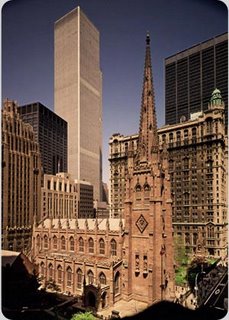 I stepped off the subway and found myself looking up at the front of Trinity Church, located at the intersection of Wall Street and Broadway. The church and its grounds are open to whoever chooses to enter, but I found that the iron fence that surrounds the church and cemetery was a psychological as well as a physical barrier to my entrance.
I stepped off the subway and found myself looking up at the front of Trinity Church, located at the intersection of Wall Street and Broadway. The church and its grounds are open to whoever chooses to enter, but I found that the iron fence that surrounds the church and cemetery was a psychological as well as a physical barrier to my entrance.I therefore remained just outside the gates; on my walk around the block I stuck close enough to brush the fence with my shoulders while I looked up at the massive “English Gothic Revival” church. Its tall spires and central tower drew my eyes up, towards the heavens, as I am sure was intended in its design.
The church is flanked on both sides by the cemetery, with its aged gravestones in hues of gray, green and brown. I was surprised to see three people clustered around a gravestone there, within the iron gates, dressed all in black. Rather than admire the stained glass windows or tall spires of the church, their heads were bowed in mourning, their backs turned to me as I gazed in from the other side of the fence. Their conversation was muted and indistinguishable. The blonde, curly hair of the sole woman in the group provided the only bright spot among their dark huddled mass.
In a cemetery so old, with names like Alexander Hamilton and Robert Fulton on its tombstones, the presence of these mourners was unusual, and I was curious which of the weather-worn tombstones held their attention. But abruptly the conversation ended and I was left on my side of the fence while they walked away.
Thursday, October 12, 2006
This might not be funny to anyone else, but trust me, it was hilarious at the time.
Ok, here's what happened. So we were talking one night, right, and so Dan was like, "Robby, go get me a bagel at the deli." Robby said no, even though Dan said, "Please." Robby disputes this fact, the record should show - but he is stupid.
Anyway, I said that I bet he would get one if his girlfriend Sarah asked, but he insisted that he would not unless she came down to the store with him. And Dan was like, "Yeah, she'd give you kisses the whole way there" - or something like that. So I said that I would give him kisses all the way there if he went, but he just laughed and said "No."
I called him on his bluff and and I fucking dared him to take me up on my offer. Dan and Jeff tried to get him to do it too, but he was too much of a pussy, because he is not comfortable with his sexuality and I am.
Here's where you have to use your imagination and picture me and Robby in the deli waiting for the bagel, and all the time I have to keep kissing him on the cheek. Honestly, I think I might have done it. But I knew I would never have to, because Robby is such a mondo wimp. Plus, I'm wearing flannel and I would have had boots. Doesn't get much manlier than that.
Janus Films Retrospective
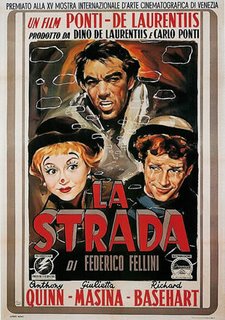 Published in the Summer 2006 issue of Filmmaker Magazine:
Published in the Summer 2006 issue of Filmmaker Magazine:This year’s Retrospective at the New York Film Festival will celebrate “50 Years of Janus Films,” a collaboration among the NYFF, Janus Films and Criterion. From Italian neo-realism and the French New Wave to Japanese samurai epics and films filled with existential inquiries, the festival will showcase more than 30 world cinema classics, all of them screening in pristine new prints at the Walter Reade Theater.
“Anybody who saw these movies years ago was used to seeing them in spliced and scratched 16mm prints,” says Film Society of Lincoln Center Associate Director of Programming and retrospective curator Kent Jones. “That’s just the way things were. Now, the standards have changed and we are proud to be able to show [the films] in new prints on the big screen. It’s going to look spectacular.”
The retrospective will take place from September 30 to October 27, opening with Jean Renoir’s 1939 masterful portrait of the French bourgeoisie The Rules of the Game. Other screenings will include Jean Cocteau’s Beauty and the Beast (1946), Akira Kurosawa’s Seven Samurai (1954), Federico Fellini’s La Strada (1954), Ingmar Bergman’s The Seventh Seal (1957), Michelangelo Antonioni’s Eclipse (1962), Roman Polanski’s Knife in the Water (1962) and François Truffaut’s The 400 Blows (1959), among others.
Janus Films was once synonymous with bringing the best foreign feature films to American theaters, but the prevalence of DVDs and home theater systems has in many ways diminished the art house circuit on which Janus based its reputation. “50 Years of Janus Films” hopes to reintroduce audiences to the distributor’s canon of films in the manner in which they were always meant to be experienced, in pristine 35mm.
The New York Film Festival celebrates its 44th anniversary in 2006. The 17-day noncompetitive festival, which runs from September 29 through October 15, takes place at Alice Tully Hall and the Walter Reade Theater at Lincoln Center.

Close Captioned
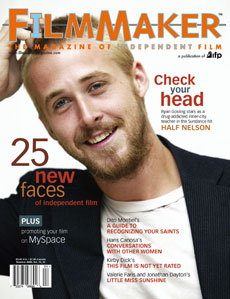 Published in the Summer 2006 issue of Filmmaker Magazine:
Published in the Summer 2006 issue of Filmmaker Magazine:So you’ve always wanted to watch those old Superman cartoons of the 1940s, but you’ve just been waiting for the Serbian translation? Always complained about how not enough American documentaries can be seen in your native Dutch or Tibetan? Crossed your fingers hoping that your music video could be understood in Japanese, Portuguese and Romanian?
There may finally be a solution.
dotSUB is a new online web browser-based tool that renders text in real time onto moving images as subtitles in, conceivably, any language on Earth (even including Esperanto). Anyone who is bi-lingual can register and voluntarily begin translating available films using time captured transcriptions. dotSUB is currently in its second beta version and will officially launch this fall, when the software will be available to embed as an API on any site free of charge, so people all over the world can begin translating any available online video libraries.
At this stage, which clips are subtitled into which languages is up to the translators, not the filmmakers or dotSUB itself. Any film in any language can be hosted on the site free of charge and translated into multiple languages by obtaining permission from the film’s rights holders to create a derivative work.
“We’re focused on the 99.5 percent of filmmakers who don’t have the multi-million dollar budget to translate and subtitle their films,” says dotSUB founder and CEO Michael Smolens. “We want to allow people from any culture to watch the films of any other culture.”
The next goal for dotSUB is to facilitate distribution of the final subtitled films - which can be delivered in web-based streaming video, DVD, or VHS formats – in theaters, on public TV or cable TV channels in all countries, to cell phone carriers interested in local language content, and directly to end users, in the end hopefully reaching a much broader audience than was ever possible before.
Visit http://www.dotsub.com for more information and to watch subtitled films.
The 12 Disciples of Nelson Mandela
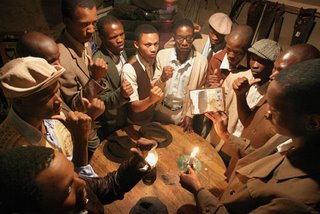
After the death of his stepfather, artist and filmmaker Thomas Allen Harris searches for a greater understanding of the life of the man he could never call “father” in the documentary The Twelve Disciples of Nelson Mandela. Pule Benjamin Leinaeng, known as Lee to his friends and family, was one of the first wave of South African exiles who left his home country in 1960 to fight apartheid, eventually leading him to the Bronx and into Harris’ family.
The search for information about Lee’s past leads Harris to a photograph of the “Bloemfontein Twelve,” a group of South African students, including Lee, who joined together to keep the anti-apartheid movement alive from East Africa, Europe, America and Cuba. Harris seeks out the surviving members, who called them themselves the Disciples of Nelson Mandela, and mixes interviews with dramatic reenactments of their adventures to create a unique journey into the life of a mysterious man.
Harris’ film is thematically similar to the 2003 doc My Architect, director Nathaniel Kahn’s critically acclaimed effort to learn about the deceased father he barely knew. In both films, father and son reach a posthumous reconciliation after conversations with friends, family and colleagues reveal a man much more complex and conflicted than either son could have realized. But whereas Kahn’s film frames his father’s life within his career as an architect, Harris uses the surviving disciples to learn not only about his father, but also about his cultural history.
“The Twelve Disciples of Nelson Mandela is a story about family and displacement,” Harris says. “A son's relationship to a father, and a father's relationship to a fatherland. I wanted to reconnect with Lee by way of the men who were bonded to him by a common political, historical and emotional journey. It was only in the process of making this film that I realized just how much I was his son.”
The Twelve Disciples of Nelson Mandela had its broadcast premiere on the PBS documentary series P.O.V. on Tuesday, September 19. The film is a co-production of the Independent Television Service (ITVS), in association with American Documentary/P.O.V. and the National Black Programming Consortium.

Wednesday, October 11, 2006
A Bronx Tale
Bronx, New York, Feb. 24 - The police officers of NYPD’s 44th precinct in the Bronx are considered the second most active in New York City, those of the Bronx’s 46th Precinct being only slightly busier. Within about two square miles of the South Bronx, there are 125,000 people, 18 elementary schools and more than two dozen churches, and there were 16 murders, 38 rapes and 564 robberies in 2005.
We arrive at the police station at 4 p.m. for a civilian ride-along, and are told to wait for roll call before we can be assigned to a car. Half an hour passes, and within the baby blue cinderblock walls of the waiting room police officers come and go, chatting and joking with each other while Nickelodeon cartoons play on a television suspended from the ceiling. Moments of silence are punctuated by the rumble of the elevated 4 subway that passes directly above the station.
An hour has gone by. Officers are searching for extra bullet-proof vests in surrounding precincts, after it is determined that there are none to be found here.
Diane Powell, 48, has been a police administrative Assistant for the past 10 years, and she warns us about the neighborhood while we wait. “This is hell right here,” she says. “I’ve seen it all! Only at the four four.”
The crime rate is decreasing rapidly here, but the addition of 100 new recruits to the ranks at Precinct 44 this year alone suggests that there is more to be done. Police say that residents notice their added presence and feel safer because of it, even if the officers' jobs haven’t gotten any easier.
More than two hours have passed before we strap on our vests and leave the police station at 6:15 p.m. We get in a car with officers Craig Carroll, 23, and Gabriel Paez, 26, who work the 4 p.m. to 12 p.m. shift. Officer Paez is a short man of Hispanic descent, with a long jaw and shaved head. Carroll is white and slightly taller, with wavy brown hair and a young pudgy face. They have been partners for about six months. Due to a shortage of officers tonight, they are one of only four or five cars on patrol, compared to the usual eight or nine. At any one time, there are 60 to 70 officers patrolling the precinct on foot, most of them new recruits who have been on the force for little more than a month.
As we begin our patrol, Officer Paez immediately reinforces what we have heard about the South Bronx. “It’s the most shooting, the most homicides, the most everything,” he says. “It’s a really, really rough area. Whatever you can think of, it has happened here, or it is happening, or it will happen.”
We drive in seemingly endless circles as we wait for news on the radio. We pass neon-lit streets lined with litter, where Officer Carroll says, “Out of the people we pass tonight, guaranteed there will be 10 to 15 people carrying guns. Guaranteed.” We keep driving. On Morris Avenue, a building that looks less like the homeless shelter it is than the prison it could be sits directly across the street from a high school. We keep driving.
The 44th precinct is home to Yankee Stadium and Grand Concourse, two miles of waterfront and 53 acres of parkland. And while the Bronx is known as a dangerous borough, the 44th precinct is one of the most dangerous areas, having already tallied one rape, 29 robberies and 38 assaults in the month of January alone. The majority of its residents would be considered minorities in other regions; the population is 58 percent Hispanic, 36 percent black, and only one percent white.
When looking for a suspect, “it’s the same description every time: black male, wearing a black jacket and dark jeans,” Carroll says. “Black people say to me when I pull them over that it’s racial profiling. That’s just stupid in this neighborhood. Now if I pulled over a white guy, he could accuse me of racial profiling.”
The car is called to Bronx Lebanon Hospital to resolve a dispute between a man and hospital security. When we arrive, a tall black man wearing a long fur coat and fur hat is pacing the sidewalk in front of the emergency entrance, crying. Carroll and Paez try to calm him down and lead him inside, where he claims that he needs his medicine, that he has been beaten by police, and then he starts crying again, while a crowd has begun to gather around us. The police and hospital security lead him outside again, where he is told he will not be allowed back in. He walks away.
“That guy was crazy,” Paez says. “E.D.P.s are the worst.” E.D.P. is short for “emotionally disturbed person.”
Paez graduated from Syracuse University in 2002, but found that he hated the corporate world and needed to get out. He returned to his hometown in the Bronx and began his career as a police officer. Carroll says that he was lost at college, so he left after three years to join the NYPD. Now he is going back to school to earn his bachelor’s degree, and Paez is working on his master’s. After 20 years working for the NYPD, they will both be eligible to retire with half-pay and benefits for life.
Paez and Carroll both say they love their jobs. “There are good people here,” Carroll says. “We just don’t deal with them. We don’t get invited to birthday parties.”
But, Paez says, “you gotta have a good sense of humor, and you gotta have a good time. You go crazy otherwise.”
Blog Title
First Post
First Lady Eleanore Roosevelt born, 1884.
Author Elmore Leonard born, 1925.
Actress Joan Cusack born, 1962.
Actor Luke Perry born, 1967.
This blog born, 2006.
Now I don't expect to be as beloved as catsup and pickle mogul Henry Heinz (also born on this day, don't forget the theme that I'm quickly beating into the ground), but maybe somebody out there will be interested in my ramblings. If not, don't complain to me because there's no reason you should be taking the time to read this anyway.
I don't intend for this blog to record all my daily thoughts, or comment on current events, or provide much of a consistent source of anything at all. Mostly I'm too poor (or is it just cheap and lazy?) to actually take the initiative to launch my own website. Why not a blog instead. Soon I'll be posting my writings, my thoughts, maybe even my pictures - but no promises. This could be my last post, or it could be the first of many, many more.
So call this a mission statement of sorts, just without a mission.
Besides, if October 11 was good enough to give Jimmy Carter a Nobel Prize, and if it was good enough to found the Daughters of the American Revolution, then it's good enough for me.


